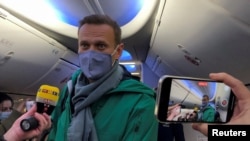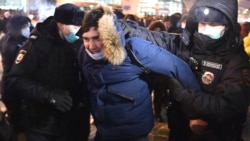After an absence of nearly five months, outspoken Kremlin critic Aleksei Navalny, the victim of a suspected Novichok nerve-agent attack, returned home to Moscow on January 17 to a detention by police. But even in detention, the 44-year-old politician and his accusations that senior Russian officials attempted his assassination pose a potential political threat to the Kremlin, some analysts say.
“Today is a fight over the picture” of Navalny’s homecoming, commented Russian political analyst Kirill Rogov. Preventing images of supporters cheering the return of Russia’s most prominent opposition figure from medical treatment in Germany is “a very important task for the Kremlin,” Rogov said.
A throng of international journalists used smart phones to film the 44-year-old activist and his wife, Yulia Navalnaya, both on his flight from Berlin and in Moscow’s Sheremetyevo International Airport. That attention included footage of his discussion with customs police and regular law enforcement at passport control and his subsequent detention.
WATCH: 'In The Absence Of My Lawyer, I Won't Say Anything': Aleksei Navalny's Detention
In apparent contradiction of the law, police did not allow Navalny’s lawyer, Olga Mikhailova, who already had passed through passport control, to accompany her client, who was detained in the airport’s gray zone. Roughly 45 minutes after his detention, Mikhailova told Current Time that she still did not know Navalny’s whereabouts.
The Federal Penitentiary Service stated that Navalny was detained for alleged “multiple violations” of a suspended 2014 criminal sentence – a sentence that has been rejected by the European Court of Human Rights (ECHR) as "arbitrary and manifestly unreasonable.”
In keeping with recent constitutional changes, little suggests that Moscow intends to honor the ECHR ruling now. Navalny will be kept in detention until a January 29 court hearing on the Service’s request that the suspended sentence be converted into a 3 ½-year prison sentence.
The human-rights watchdog Amnesty International has since declared Navalny a prisoner of conscience. Police taking the opposition leader into custody “is further evidence that [the] Russian authorities are seeking to silence him,” Amnesty International’s Moscow office director, Natalia Zviagina, commented in a statement.
A separate fraud case against Navalny carries a potential prison term of 10 years. The case was filed just over a week after his December 2020 phone call with an apparent Federal Security Service (FSB) officer who indicated that a team of FSB employees had been assigned to follow and poison the activist.
Zviagina emphasized the need for further investigation into these claims.
But if his investigation of the FSB caused Navalny any unease at the prospect of risking arrest or detention upon his return to Russia, he did not express it publicly.
Posing before a mural of the Kremlin inside Sheremetyevo, Navalny described his return as “My happiest day for the past five months.”
“I know that I’m right,” he asserted. “I know that the criminal cases against me are fabricated. “
“I’m not afraid, and I urge you not to be afraid,” he added.
Nonetheless, some observers have questioned why Navalny did not opt to stay in Germany;
Returning on the eve of Russia’s 2021 parliamentary elections, expected by late September, would have had “the maximum emotional effect,” advised political analyst Abbas Gallyamov, a former speechwriter for Russian President Vladimir Putin.
But Bellingcat investigative journalist Christo Grozev believes that Navalny remaining in Germany only would have played into mainstream Russian TV channels’ attempts to cast the opposition leader as a sell-out to the West.
“He would simply become a commentator on Russian events for a Western and not a Russian audience,” said Grozev, who collaborated with Navalny on an international media investigation into alleged ties between the FSB and the activist’s Novichok poisoning.
“Therefore, I completely understand him: He should be in Russia so that people reckon with him as with a politician in Russia.”
Grozev added that the investigative team intends to continue its work with a report next week that alleges that the FSB has targeted other individuals aside from Navalny.
But Rogov cautioned against expecting any large-scale popular response in favor of Navalny now that he has returned to Moscow.
“There might be some speeches. However, the poisoning of Navalny didn’t spark any mass protests. And that’s an alarming sign for society and an agreeable sign for the Kremlin,” Rogov said.
Now that he has returned, however, “the Kremlin’s task is to isolate Navalny because he has grown unacceptably [in public prominence]” since the poisoning, noted political analyst Dmitry Oreshkin.
Shortly before his scheduled arrival in Moscow, Navalny’s flight on discount Pobeda (Victory), part of the state-run Aeroflot airline, was diverted from Moscow’s Vnukovo International Airport to the larger Sheremetyevo International Airport.
The flight’s pilot mentioned broken landing gear at Vnukovo as the reason, reported Current Time Evening anchor Igor Sevryugin, who was on the flight. Navalny’s press secretary, Kira Yarmysh, also on board the flight, scoffed on Twitter that the change confirmed the government’s fear of Navalny.
Since the afternoon, footage from Vnukovo had shown roads lined with police vans, and fully helmeted riot police in camouflage inside the airport. In keeping with an earlier order, journalists were not allowed to film inside the building, and tickets were required for any person seeking to enter.
Detentions of both assembled Navalny supporters and some media at the airport began shortly before the scheduled arrival of Navalny’s plane. An estimated 60 people were detained, according to the non-governmental law-enforcement monitor OVD-Info.
Among that number were six of Navalny’s allies, including Lyubov Sobol, a lawyer for his Anti-Corruption Foundation. The reason for their detention was not clear.
WATCH: January 17, 2021 Detentions At Vnukovo Airport
Yet, despite the risk of negative publicity from such moves, the image of police using force “is better for the Kremlin than that of Navalny’s triumphant return,” observed Gallyamov.
If Navalny is imprisoned for the long term, some observers have wondered whether Yulia Navalnaya, like Belarus’ Svyatlana Tsikhanouskaya, will take her husband’s place as a politician and carry on his projects. Analysts interviewed by Current Time, however, believe such speculation is premature.
Carrying a bouquet of flowers while onlookers called out encouragement, Navalnaya largely avoided journalists’ questions as she left Sheremetyevo. But her parting message before getting into a car struck a familiar note.
“He’s not afraid. And I’m not afraid,” she said.

















